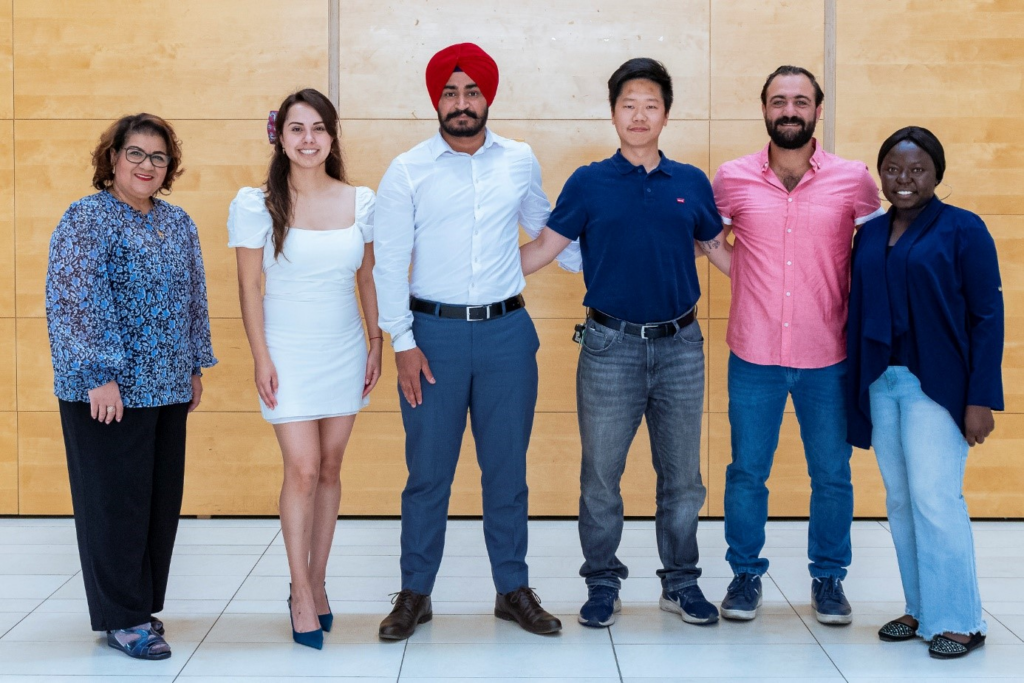The United Nations has designated 21 May as the World Day for Cultural Diversity for Dialogue and Development, drawing attention to the importance of the values of peace and solidarity. Széchenyi István University celebrated this with an intercultural programme. The event featured international students and alumni from India, China, Mexico, Syria and Nigeria, who highlighted the unique characteristics of their home countries.
Széchenyi István University has been offering English-taught courses for nearly ten years and now has a thousand international students from 77 countries. The university is also an associate member of the United Nations Academic Impact (UNAI) programme, which is an initiative of the United Nations system of higher education institutions, and therefore attaches great importance to supporting the Sustainable Development Goals.
The event held on the Győr campus on the UN World Day for Cultural Diversity, Dialogue and Development was closely linked to these goals. The event brought together international and Hungarian students to celebrate cultural diversity, the importance of which is reflected in its inclusion in the UN Global Public Goods in 2022.
Each speaker presented the uniqueness of their country, its celebrations and customs, and the most important differences between their country and Hungary.

The international students of Széchenyi István University celebrated the World Day for Cultural Diversity, Dialogue and Development with an intercultural programme organised by the International Programmes and Alumni Centre of the institution.
William Alizaree, a Master’s student in Business Informatics, came to Győr from Syria with the support of the Scholarship Programme for Christian Youth (ÖKF). He said that he encountered many stereotypes in Hungary, which is why he sees it as his mission to show the rich culture and values of his country. „Most people think that Syria is only inhabited by Muslims, but the reality is that it is equally inhabited by Christians and people of other religions. Even in the capital Damascus, Christian churches, Muslim mosques and 12th-century fortress walls are all present,” he said, and added: „Everyone has their own history and differences, but we are all human beings and this is what binds us together.”
After Syria came Nigeria, Africa’s most populous country, which was introduced to the participants by Felicity Thomas, also an ÖKF recipient. „Nigeria is an extremely diverse country, with over 250 ethnic groups speaking hundreds of different languages and dialects. It is a perfect example of this that my parents’ language is not the same, so it was amazing for me to experience in Hungary that everyone speaks the same language,” she discussed. Felicity, who studies International Economics & Business, also said that she had discovered many similarities between the two countries, such as the central role of the family and the love of dancing and food.
The world’s second most populous country, China, was introduced by Guo Shaofeng, who arrived in Győr in 2018 and is currently studying for a Master’s degree in Supply Chain Management after completing his bachelor’s degree in Automotive Engineering. He said that there are many differences between Hungarian and Chinese culture, including the nature of holidays, gastronomy and the role of kinship. „Despite the differences, there is a good relationship between the two countries, but when people think of China, they often think of the old, traditional symbols – such as tea culture, the Great Wall or the Forbidden City. I hope that in the future we will be known more for our technological development and energy-efficient car industry,” he said.
Representing the Americas was Diana Nuñez, a Stipendium Hungaricum scholarship student from Mexico, who is also studying for a Master’s degree in Supply Chain Management at the University. She was proud to point out that Mexican gastronomy, with its Spanish, French and African influences, is now a UNESCO World Heritage Site. „In addition to food, we are also interested in celebrations, one of the most important of which has become known outside Mexico, mainly through the animated film Coco. We believe that on the Day of the Dead (Día de Muertos), the gateway between the earthly world and the spirit world opens and our deceased loved ones visit us. For us, it is a colourful, loving and spiritual event that families spend in a spirit of togetherness,” the Latin American student explained.
The final speaker of the ceremony was Amandeep Singh, a former Stipendium Hungaricum Scholar, who introduced the audience to India. The young automotive engineering graduate presented the world’s most populous country as a state with a rich culture and a fast-growing economy, where thousands of dialects are spoken by a diverse religious community. „India has beautiful landscapes – it’s not just the Taj Mahal that is worth visiting. In the north, there are fabulous mountain ranges and in the east, forests and nature. If you like the beach and palaces, the south has what you’re looking for. In the west, the Pakistani border offers some excitement,” he concludes.
At the end of the event, Ms Sylvia Kinga Páliné Nyiri, of the International Programmes and Alumni Centre, said her thanks on behalf of the organisers. She said it was a source of pride to see such a cohesive and diverse international community at Széchenyi University. „If we focus on what unites us rather than what divides us, the world can become a much better place. Diversity is also important and beneficial because when people from different cultural backgrounds work together, they can often achieve better results together as well. We must value and respect differences and diversity and commit to the protection of human rights, which opens space for development and dialogue,” she said.






